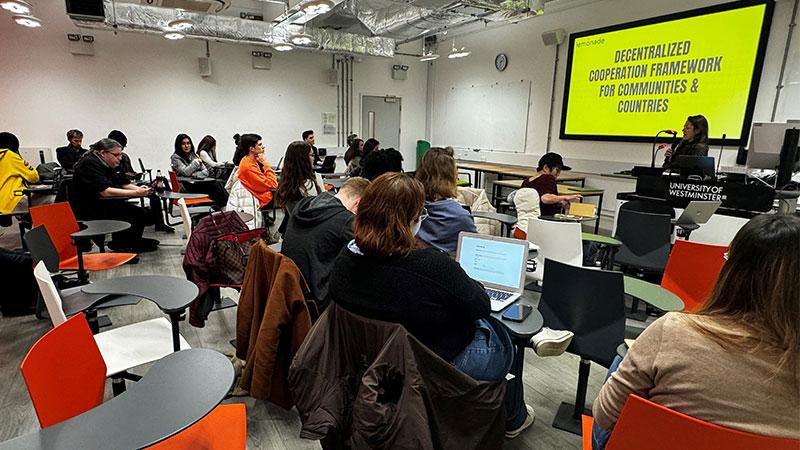A cutting-edge public lecture series in Law, Governance and Digital Technologies, titled Emerging Normativities, has been launched, inviting internal and external audiences who are interested in cryptocurrencies and blockchain technology to collectively delve into what is increasingly recognised as the new frontier of governance.

With climate change reshaping the material and social landscape of the planet, there is a growing skepticism towards traditional representative governmental structures, accompanied by a heightened desire for alternative economic models. This significant shift is occurring against the backdrop of the rise of authoritarian regimes and an increase in global conflicts. Simultaneously, revolutionary technologies such as distributed ledgers, networks of connected devices and tech, robotics, AI and mixed reality, are challenging and reshaping traditional political and legal frameworks.
Addressing this dynamic force field is the Emerging Normativities lecture series, spanning four thought-provoking sessions and featuring voices from China, Switzerland, Palau, UK, Palestine, USA and the Netherlands. At the core of this exploration are fundamental questions surrounding the digital social contract: Who or what is responsible for drafting it, and for whom?
The series has been organised by Dr Daniela Gandorfer as part of a seminar for the newly launched Law and Technology LLM course at the University of Westminster Law School. Westminster has also collaborated with Logische Phantasie Lab (LoPh), a nonprofit organisation working on governance models and community-empowerment at the intersection of climate change and new digital technology.
The first lecture on Ground-Level Narratives: Digital Democracy in Taiwan and Web3-City Prototyping in Zanzibar, featured Celin Mousa, co-founder of MCS Data Labs Gmbh and LemonadeDAO contributor, and Yun Chun, an open source activist and g0v contributor.
The event was opened with an introduction by Dr Gandorfer, emphasising the importance of building bridges between universities and tech spaces, thereby broadening the perspective from LegalTech to the tech-led governance frontier.
Yun Chun has worked on various CivilTech projects, including Disfactory.tw, a Taiwanese reporting platform for illegal factories on farmland in Taiwan. During the event she critically asked what the current normativities in the intersection of tech and democracy were. She also addressed power dynamics that could not be fixed through technological tools only, emphasising the positive impact CivilTech projects can have on social and environmental problems. To conclude she called for the decolonisation of knowledge and closer attention to be made to power relations as a prerequisite for sustainable decentralised societies.
On the topic she said: “You can’t fix broken things by digital technology. You will only get digital broken things.”
Celin Mousa followed and explained the workings of blockchain technology and its potential for building a decentralised cooperation framework for communities as well as countries. After introducing the approach LemonadeDAO is taking on building a network state, she shared her insights from prototyping a decentralised community in Zanzibar. She emphasised the importance of local community participation in drafting a decentralised social contract and called on universities and academics to get involved in these processes.
Although the event ended after two hours, having brought together a diverse audience in person and online, the discussions continued over hot chocolate and tea in the basement of Café Nero, where a dozen students, tech community members and the speakers thought about possible ways of collaboration.
About the event Dr Gandorfer said: “Digital technologies are shifting not only how we live but also how we govern and are being governed. The event showed how these questions go far beyond regulation and demand both a critical and a creative approach towards ways of living together on a shared planet.”
This event contributed towards the Climate Action (13) and Peace, Justice and Strong Institutions (16) development goals of the United Nations’ 17 Sustainable Development Goals (SDGs) which were adopted by the University of Westminster to help make the University a more sustainable, responsible and inclusive place to live, work and study.
The next session, Architectures on Network States and StartUp Cities: From Palau to Ukraine, will take place on 22 February and will be moderated by Professor Luke Mason, Head of Westminster Law School.
Find out more about Law courses at the University of Westminster.




